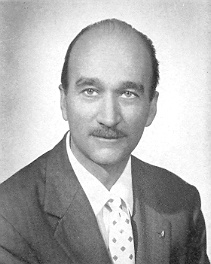Giorgio Almirante facts for kids
Quick facts for kids
Giorgio Almirante
|
|
|---|---|
 |
|
| President of the Italian Social Movement | |
| In office 24 January 1988 – 22 May 1988 |
|
| Preceded by | Nino Tripodi |
| Succeeded by | Alfredo Pazzaglia |
| Secretary of the Italian Social Movement | |
| In office 29 June 1969 – 13 December 1987 |
|
| Preceded by | Arturo Michelini |
| Succeeded by | Gianfranco Fini |
| In office 15 June 1947 – 15 January 1950 |
|
| Preceded by | Giacinto Trevisonno |
| Succeeded by | Augusto De Marsanich |
| Member of the European Parliament for Southern Italy |
|
| In office 17 July 1979 – 22 May 1988 |
|
| Member of the Chamber of Deputies | |
| In office 8 May 1948 – 22 May 1988 |
|
| Constituency | Rome |
| Personal details | |
| Born | 27 June 1914 Salsomaggiore Terme, Italy |
| Died | 22 May 1988 (aged 73) Rome, Italy |
| Political party | National Fascist Party (1930s–1943) Republican Fascist Party (1943–1945) Italian Social Movement (1946–1988) |
| Spouses | Gabriella Magnatti (m. 1930s; div. 1969) Assunta Almirante
(m. 1969) |
| Children | 2 |
| Parents | Mario Almirante Rita Armaroli |
| Occupation | Journalist, politician |
| Military service | |
| Allegiance | |
| Branch/service | |
| Years of service | 1943–1945 |
| Rank | Capomanipolo |
| Battles/wars | World War II |
Giorgio Almirante (born June 27, 1914 – died May 22, 1988) was an important Italian politician. He started a political party called the Italian Social Movement, which was a neo-fascist party. He led this party for many years until he retired in 1987.
Contents
Early Life and Education
Giorgio Almirante was born in Salsomaggiore Terme, a town in Italy. His family had noble roots from a region called Molise. His aunt, Italia Almirante Manzini, was a famous actress.
Because his parents worked in the theatre, Giorgio spent his childhood moving around. He lived in cities like Turin and Rome. He studied literature and graduated from university in 1937.
Early Career and World War II
Almirante first trained to be a schoolteacher. However, he soon started working as a journalist. He wrote for a fascist newspaper in Rome called Il Tevere.
He was greatly influenced by another journalist, Telesio Interlandi. Almirante wrote many articles for Interlandi's journal, La Difesa della Razza, which focused on ideas about race. During World War II, he also helped set up the Italian Social Republic. In 1944, he became the Chief of Cabinet for the Minister of Culture in this government.
The Italian Social Movement
Leading the Party
After World War II ended, Almirante returned to Italy. In 1946, he started his own small political group. This group quickly joined a new, larger party called the Italian Social Movement (MSI).
Almirante was chosen to lead the MSI. This was partly because other high-ranking members from the previous fascist government preferred to work behind the scenes. At first, Almirante represented a more extreme part of the party. However, more moderate members gained influence, and he stepped down as leader in 1950.
A Voice of Opposition
In the mid-1950s, Almirante became concerned that the MSI was becoming too conservative. He resigned from the party's main council and became a critic of its leaders. He believed that the party should remember its working-class roots.
He argued for "quality" in government, meaning that experts should lead, rather than relying only on liberal democracy. Even though he disagreed with the party's direction, he chose to stay within the MSI. He also became interested in the ideas of philosopher Julius Evola.
Almirante was known for his strong opinions. In 1968, he was involved in a clash with student protesters at the University of Rome. He and about 200 followers were eventually protected by the police during this event.
Return to Leadership
Almirante became the leader of the MSI again in 1969. By this time, his own views had become more moderate. He began to support democracy and wanted to attract more conservative voters to the MSI. He also made changes to strengthen the party leader's power.
He tried to make the party's image less extreme. He stopped using obvious symbols of fascism, like the black shirt and the Roman salute. His new approach was called the strategia del doppio binario, or "double track strategy." He wanted the MSI to challenge the main conservative party, the Christian Democrats.
Almirante believed that by focusing on being against communism, the MSI could attract both its current followers and more moderate conservatives. He brought in different right-wing groups to join the MSI. However, this plan did not fully succeed in winning over many new voters.
Despite this, under Almirante's leadership, the MSI became more accepted in Italian politics. For example, in 1984, Almirante was allowed to visit the headquarters of the Communist Party to pay respects to their deceased leader, Enrico Berlinguer. This was a very significant gesture at the time.
During his time in parliament, Almirante faced investigations related to his political past. However, these issues were later resolved by a general pardon in 1987.
Retirement and Legacy
Due to his declining health, Almirante stepped down as leader at the 1987 National Congress. His chosen successor was Gianfranco Fini. Fini had been close to Almirante since 1977 and continued Almirante's goal of changing Italy's political system.
Giorgio Almirante passed away in Rome on May 22, 1988. He died on the same weekend as two other important Italian political figures, Dino Grandi and Pino Romualdi.
Electoral History
| Election | House | Constituency | Party | Votes | Result | |
|---|---|---|---|---|---|---|
| 1948 | Chamber of Deputies | Rome–Viterbo–Latina–Frosinone | MSI | 15,501 | ||
| 1953 | Chamber of Deputies | Rome–Viterbo–Latina–Frosinone | MSI | 51,923 | ||
| 1958 | Chamber of Deputies | Rome–Viterbo–Latina–Frosinone | MSI | 49,828 | ||
| 1963 | Chamber of Deputies | Rome–Viterbo–Latina–Frosinone | MSI | 46,597 | ||
| 1968 | Chamber of Deputies | Rome–Viterbo–Latina–Frosinone | MSI | 54,200 | ||
| 1972 | Chamber of Deputies | Rome–Viterbo–Latina–Frosinone | MSI | 218,642 | ||
| 1976 | Chamber of Deputies | Rome–Viterbo–Latina–Frosinone | MSI | 123,331 | ||
| 1979 | Chamber of Deputies | Rome–Viterbo–Latina–Frosinone | MSI | 114,258 | ||
| 1979 | European Parliament | Southern Italy | MSI | 519,479 | ||
| 1983 | Chamber of Deputies | Rome–Viterbo–Latina–Frosinone | MSI | 129,375 | ||
| 1984 | European Parliament | Southern Italy | MSI | 503,881 | ||
| 1987 | Chamber of Deputies | Rome–Viterbo–Latina–Frosinone | MSI | 108,821 | ||
See Also
 In Spanish: Giorgio Almirante para niños
In Spanish: Giorgio Almirante para niños
 | Kyle Baker |
 | Joseph Yoakum |
 | Laura Wheeler Waring |
 | Henry Ossawa Tanner |


